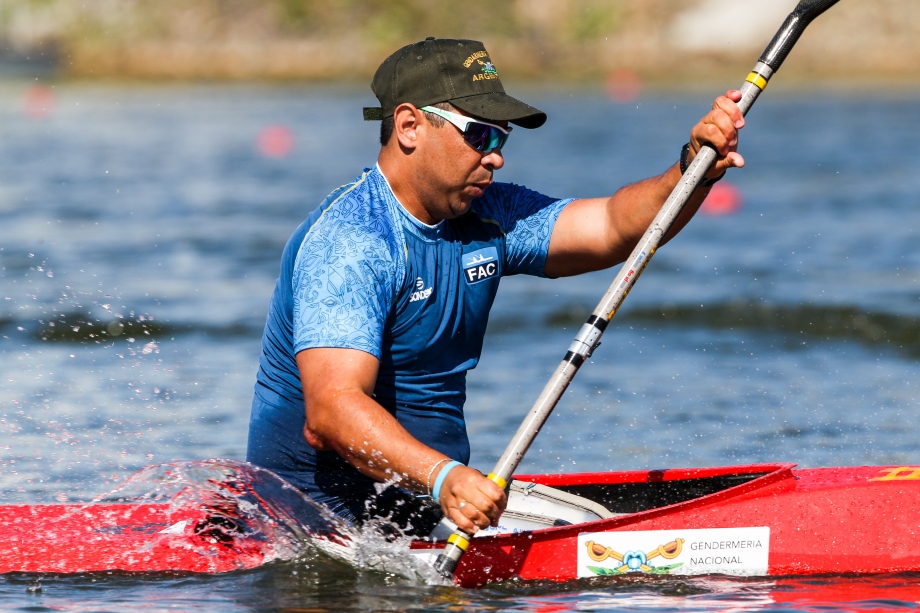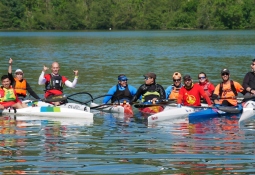There are five days in 2015 that Ariel Atamañuk has no memory of.
They were the five days he spent fighting for his life, lying unconscious in an Argentine hospital after a road accident left him without the use of his legs, with a broken arm, displaced hip, a fissured vertebra and a severed kidney.
Next month, May 2021, 37-year-old Atamañuk will take on another fight, albeit one which he is much better prepared for and without the dire consequences he faced six years ago if it all goes wrong. He will attempt to qualify for this year’s Tokyo Paralympics in the sport of paracanoe.
It’s been a journey of passion, hard work and commitment for the gendarme who had never sat in a canoe before his road accident. He played football and enjoyed running, but neither at a level that might one day see him representing his country at an international event.
Paracanoe never even crossed his mind in the weeks after his accident, as he decided to find a sport he could do to help his recovery and to give himself something to focus on.
He decided to go the 2016 Paralympics in Rio, partly as a spectator, but also to help him get an insight into how others with a disability coped. Maybe he might even find a sport he could take up.
Paracanoe was still not on his radar when he left Rio. In fact, it wasn’t until he went to a sport open day in Buenos Aires and spotted a canoe in a swimming pool that he even realised the sport existed.
Now in 2021, he heads to Szeged as a South American and Pan American paracanoe champion. People talk about someone being a ‘natural’, and when it comes to sitting in a canoe and paddling fast, Ariel Atamañuk seems about as natural as you can get.
God saw that I was not selfish and granted me the miracle of staying alive
Atamañuk is no stranger to sacrifices. He ended up a double amputee because of an incredible sacrifice he made which, according to many, saved the lives of up to 30 people.
On March 15, 2015, Atamañuk was driving a bus carrying 34 colleagues to Cordoba, a region hit hard by flooding. In teeming rain, a truck travelling in the opposite direction suddenly veered into the path of the bus carrying the Argentinian gendarmes.
Atamañuk had to make a split second decision. Unable to avoid a collision, he pulled hard on the steering wheel to try and lessen the impact on his passengers, even though he was putting his own life in danger.
From the tangled wreckage, one of Atamañuk’s passengers lost his life. The remaining 33 escaped with their lives. But Atamañuk’s legs were crushed – he would never walk again.
“With the intention of causing the least possible damage to my 34 comrades that I was transporting, knowing that it was very difficult for me to survive, in that act, God saw that I was not selfish and granted me the miracle of staying alive,” Atamañuk said after the accident.
“Despite the effort, unfortunately in that accident, a comrade and friend died, Corporal José Olmedo, and I only lost both legs.”
The recovery was difficult, but with the support of his wife and fellow gendarme, Viviana, he set new life goals. And although it came to him almost as an afterthought, paracanoe turned out to be the perfect fit.
“When for the first time I went into a kayak, on a big lake, the feeling of the contact with nature, with the water, the feeling to be in a kayak captured my attention,” he said.
If I wanted to be good, I needed full dedication
“And then, learning more about the sport. It is a sport that always go forward, you always see where you are heading, and it give you a great panorama, and it makes you see and remember beautiful landscapes. Sometimes a training is very hard, but at the same time you see many beautiful things.
“I also like the fact that when I am on the boat, I am the only one in it, and the whole result is because of my own effort.”
Six months after first sitting in a paracanoe, Atamañuk found himself sitting on the start line at an ICF world championships in the Czech Republic. By his own admission, it didn’t go well.
One year later he competed at the world championships in Portugal, and started to feel more like he belonged. He was still a long way off the pace, but his racing was coming together, and his confidence was growing.
“I understand that I was OK, but if I wanted to be good, I needed full dedication,” he said.
“It was a wake-up to train even stronger. At the end of that 2018 season, I moved to Buenos Aires to access better training conditions, supervised by the coach, to prepare myself 100 per cent, and look forward to improvements.
“My objectives were the next PanAm championships and next world championships.”
The turnaround was nothing short of remarkable. The change of location, more focused coaching, access to better facilities, soon morphed into quicker times. Much quicker times.
We fought together to get better together
Atamañuk won the PanAm Championships in Brazil in 2019. He also made B finals in both the KL2 and VL3 at the ICF world championships in Hungary.
He will contest both classes in Szeged next month. Va’a will make its Paralympic debut in Tokyo, and that’s where the Argentinian believes he has the strongest chance of qualifying for the Games.
“In the last championships the VL3 final B race was very close, and with few tenth of seconds less, I can gain many positions,” he said.
“I have re-watched and analysed this race many times, and the finish of the race was my weakness. That is one of point I have been training since then.
“I would like to try this year to reach the A final in both kayak and va’a. And once I reach the final, dream a bit more, and dream about the podium. But of course, the quota of Tokyo is the first step.”
The lead-up to the Paralympic qualifiers have been anything but usual. Forced into lockdown in the same week he was selected on Argentina’s national paracanoe team, he switched his training from the water to an ergometer in his home gym.
The training during the pandemic for me was very good
He thought, like everyone else, it would just be a minor blip, and soon he would be back on the water. But weeks turned into a month, and then a month turned into months. Nothing was normal anymore, and athletes all over the world had to adapt.
“At home I was following the training plan of Coach Alejandro Druziuk, he was giving every week the training plan of the week,” he recalls.
“We were in constant communication. I was sending him videos, and he was correcting me. But it was a long lockdown. Nobody was expecting that, we thought it was going to be just a couple of weeks.
“It was necessary to take care, to have proper training. It was not easy, as I was alone at home, my wife was working in Colombia as a blue helmet. Well, not totally alone as I have my small dog. I have some picture of my little dog training, the dog on my back when I was doing push-ups...
“I think that the training during the pandemic for me was very good. For the mind, for the overall health, I was being careful with the food, trying to reduce the fat part as much as possible, and it is difficult because there is always food at home!”
So next month Ariel Atamañuk joins athletes from all over the world on a journey into the great unknown. No two athletes have had the same build-up to these Paralympic qualifiers.
Some have had almost no disruption. Others have barely been able to get onto the water. But like so many paracanoe athletes, Ariel Atamañuk only has to pause to remember his journey so far to find the inspiration to push on.
“At the moment of the accident, there were a lot of people visiting and your mind is occupied,” he said.
“But when you’re at home alone, this is a difficult struggle. We decided that we will win this fight together. Viviana likes to remind me how we were at the time, and how we are now, and how we fought together to get better together.
“We grew very strong during this time.”
The ICF paracanoe world cup and Paralympic qualifiers will be held in Szeged, Hungary, from May 13-15.


